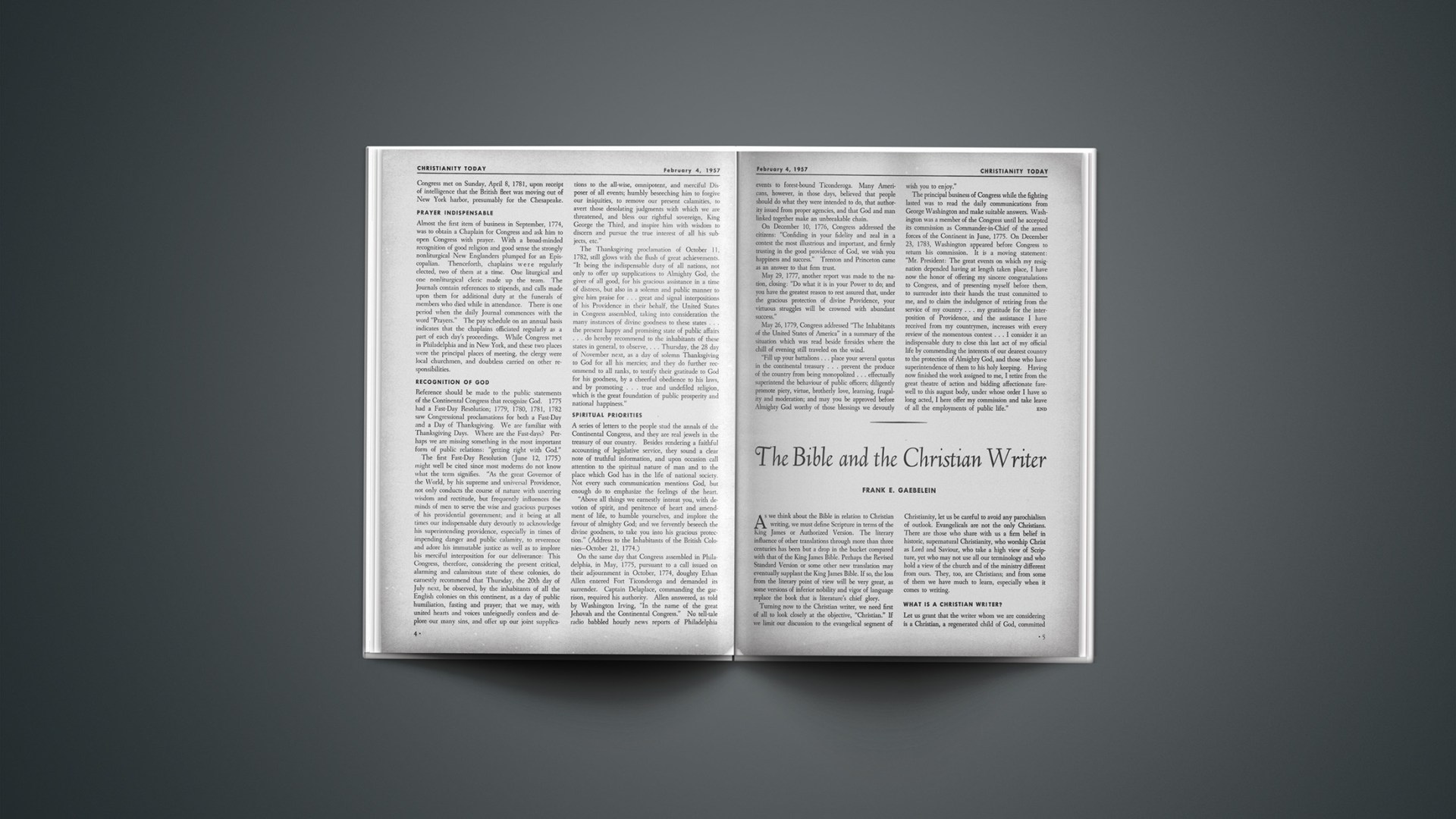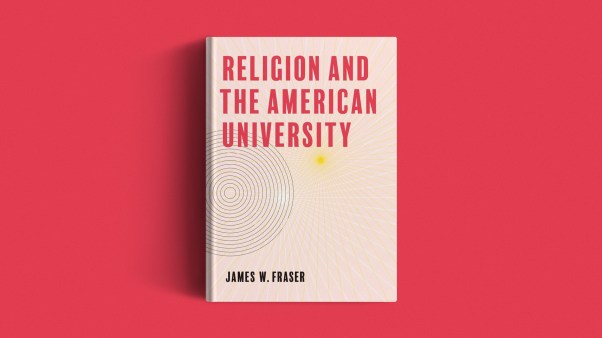As we think about the Bible in relation to Christian writing, we must define Scripture in terms of the King James or Authorized Version. The literary influence of other translations through more than three centuries has been but a drop in the bucket compared with that of the King James Bible. Perhaps the Revised Standard Version or some other new translation may eventually supplant the King James Bible. If so, the loss from the literary point of view will be very great, as some versions of inferior nobility and vigor of language replace the book that is literature’s chief glory.
Turning now to the Christian writer, we need first of all to look closely at the objective, “Christian.” If we limit our discussion to the evangelical segment of Christianity, let us be careful to avoid any parochialism of outlook. Evangelicals are not the only Christians. There are those who share with us a firm belief in historic, supernatural Christianity, who worship Christ as Lord and Saviour, who take a high view of Scripture, yet who may not use all our terminology and who hold a view of the church and of the ministry different from ours. They, too, are Christians; and from some of them we have much to learn, especially when it comes to writing.
What Is A Christian Writer?
Let us grant that the writer whom we are considering is a Christian, a regenerated child of God, committed to the evangelical doctrines of Scripture. The question is, What do we really mean when we talk about a “Christian writer?” We might say simply that we mean Christians who write. That is much too broad a definition. The other day I asked the editor of a leading Bible study magazine, “What’s the matter with Christian writing today?” His answer was candid, if not entirely elegant: “Most Christian writers,” he said, “can’t write. Many of them can’t spell or punctuate. And a lot of them have nothing to say anyway.” The plain fact is that not every Christian who writes is a Christian writer!
We must go on, therefore, to identify the Christian writer as a Christian who, being reasonably competent in the craft of writing, treats his subject in a manner that directly or indirectly reflects his spiritual convictions. He may be working in such fields as theology, biblical exposition, philosophy, or other areas closely related to the faith. Or he may be writing about so-called secular matters. Again, he may be practising what is often called “creative writing,” such as fiction or poetry. Whatever his subject matter, he is a Christian writer if the Christian world view, which is the world view based upon the Bible, is reflected in his writing.
This distinction is subtle but all-important. Reflecting the Christian world view does not mean conscious and obvious moralizing or, heaven forbid, labored preaching. It does mean that Christians, and certainly Christian writers, ought to have a God-centered view of life and the world. And it means also that this view of life, this Weltanschauung, to use the German term, is not held in a vacuum. Anyone, whether writer, teacher, or scientist, who has genuinely committed himself to the Christ who is the living God incarnate has made a decision that henceforth will color all of his work and all of his thinking. How far-reaching that decision is Browning tells us in “A Death in the Desert”:
I say, the acknowledgment of God in Christ
Accepted by thy reason, solves for thee
All questions in the earth and out of it,
And has so far advanced thee as to be wise.
All writers must write from some particular point of view. And Christian writers ought to write from a God-centered, Christ-oriented, biblical view of life.
But at this point in our discussion we must turn back to the Bible. What is there about Scripture that makes it the one book of incomparable influence upon the Christian writer? First, the truth that the Bible reveals; second, the manner in which it states this truth. The two are organically related in that the second grows out of the first. To begin with, it is primarily the distinctive, biblical view of life and the world that influences the Christian writer. The major premise of Scripture is the living God. He is the God and Father of our Lord Jesus Christ. He is the God who, through his Spirit, inspired the Book. He is the God who, when he speaks in the Book, tells the truth. In the Bible, therefore, he tells the truth about himself and about man, sin, the world that now is and the world that is to come. Thus the Bible presents a view of life and of the world distinctively its own and in a class apart from all other philosophies and all other religions. And this view the Bible equates with truth.
Next, turning to style and form, we find a correspondence with the content of Scripture. The Book that communicates truth speaks truly. The reference here is not to the inerrancy of Scripture, important though that is. Rather am I speaking from the writer’s point of view. Though we must always remember that our Bible is a translated book, it is remarkable how little fumbling for words the sensitive reader sees in Scripture. In its use of words, the Bible is the best model, because it speaks directly and truly; in it the right word is in the right place.
Think, for example, of the declaration of John the Baptist, “Behold the Lamb of God, which taketh away the sin of the world.” Here is finality of expression. So also with the words of our Lord, “By their fruits ye shall know them” or, “Come unto Me all ye that labor and are heavy laden, and I will give you rest.” Go back to the Old Testament and there is the same rightness of expression, as in the psalmist’s petition, “Search me, O God, and know me; try me and know my thoughts, and see if there be any wicked way in me; and lead me in the way everlasting.” Likewise with Job’s great affirmation: “Though he slay me, yet will I trust him.” It was not without reason that the Greek rhetorician, Longinus, in his treatise On the Sublime, which, by the way, every writer ought to know, took as an example of sublimity in literature the words of Moses in Genesis: “And God said, Let there be light: and there was light.”
Contagious Greatness Of Scripture
Now this quality of unerring choice of the right word in the right place carries over to the writer who is steeped in the Bible. In the Princeton University Alumni Bulletin (June 1, 1956), there is a moving address by Judge Harold Medina on “The Influence of Woodrow Wilson on the Princeton Undergraduate, 1902–1910,” a period covering the judge’s own college years. In this address, Judge Medina says this of Wilson:
But how he could talk! And we flocked to hear him … At first we were fascinated by his perfect diction and the skill with which he chose just the right combination of words to express his meaning. Pretty soon it dawned on us that what he had to say was important. There was no mistaking his sincerity; he spoke with a singular intensity; he was always quoting from the Bible; and bit by bit he got his spiritual message over to us …
Moral principles, ideals, action, achievement, power; all these spelled out to us in the words of Christ, with continual emphasis upon unselfishness and sacrifice, the peace and good will to men which went beyond one’s own borders and reached out to all mankind, and the unending fight against what he called “the thraldom of evil.”
Here was a man who really believed in unselfish devotion to one’s country, who was seeking, in the words he quoted from the Bible, to “prove what is that good, and acceptable, and perfect, will of God,” and to lead us out of the wilderness into green meadows where ideals and principles were formulated and acted upon. This is what young people craved to hear in 1909, it is what they crave to hear now, and it is what they will always crave to hear.
Woodrow Wilson was not only a great president; he was also a great writer, a great Christian writer, if you will. And he was a great Christian writer in large part because of his intimate and continued use of the Bible.
In his Aims of Education, Professor Alfred North Whitehead has written what Sir Richard Livingstone of Oxford calls the greatest statement about education outside Plato: “Moral education is impossible apart from the habitual vision of greatness.” Unfortunately, Whitehead lets us down as he points to the history and culture of ancient Greece and Rome as “the habitual vision of greatness.” Certainly for the Christian writer, “the habitual vision of greatness” is not classical history and literature but the Bible, the Word of the living God. And a host of great writers rise up to prove this point.
An Inescapable Influence
The influence of the Bible upon our literature is inescapable. Think of Shakespeare, who in his thirty-seven plays alluded to fifty-four of the sixty-six books of the Bible. How many Christians today know their Bibles that well? There is Bunyan, who, with meager education and knowing little beside the Bible, produced the greatest allegory in the English language. Edgar Allan Poe, whose subject matter was far removed from Scripture, drew heavily upon it, as Professor Forrest of the University of Virginia showed in his fascinating study, Biblical Allusions in Poe. We think too of Lincoln, the writer of our most imperishable American prose. In his recent book, A Clerk of Oxenford, Professor Gilbert Highet of Columbia University has a fascinating essay tracing, line by line and phrase by phrase, the influence of the Bible upon the Gettysburg Address. And at that he misses the echo of the close of the eleventh chapter of Romans in Lincoln’s climactic series of phrases: “government of the people, by the people, and for the people.”
The most telling illustration of the inescapable influence of the Bible upon great writers comes from the poet Shelley. Shelley was expelled from Oxford because he wrote a pamphlet entitled “The Necessity of Atheism.” In it he said, “The genius of human happiness must tear every leaf from the accursed Book of God ere man can read the inscription on his heart.” Or, in less rhetorical language, “Man must tear up the Bible, if he would know himself.” Just eight years later Shelley wrote his greatest prose work, the critical essay, “In Defense of Poetry.” At its climax, this is what he said: “Their errors have been weighed and found to have been dust in the balance [an allusion to Daniel]; if their sins were as scarlet, they are now white as snow [almost an exact quotation from Isaiah]; they have been washed in the blood of the Mediator and Redeemer, [New Testament, evangelical phraseology].” The brilliant, unbelieving poet of the nineteenth century could not escape the Bible.
Paradox Of Christian Writing
Now we come to the paradox of the Christian writer today. More than any other of his fellow writers, the Christian writer of our time is close to the Bible. His faith in a biblical one, so much so that he has been labeled bibliolater, biblicist, or literalist. The epithets may not be accurate, but they show that he is known for his closeness to the Bible. Yet in spite of this relationship to the Scriptures, evangelicals by and large are not writing well.
I happen to be associated with a book club that is committed to the policy of selecting for its members only evangelical writing of genuine worth. A survey of our selections since 1954 shows that a large proportion of them have been books from other countries—England, The Netherlands, Switzerland, Germany and Australia. Indeed, if we had depended upon the writings of American evangelicals, we should have had difficulty in continuing. Not only that, but of the many books submitted to us for consideration many are marred by careless writing.
To cite another example, a while ago I read Albert Schweitzer’s autobiography, Out of My Life and Work. The difference, theology aside, between this book and one by an evangelical writer that I read at about the same time was as the difference between day and night. With Schweitzer I felt in touch with a distinguished mind; the other book, although well-intentioned, was flat and uninspiring.
Evangelicals Have Written Well
It was not always so. A few generations ago, and, in fact, even more recently, evangelicals were writing a great deal better than today. Nor need we go as far back as Bunyan. Take, for example, a man of more modest ability, the Princeton theologian Charles Hodge. This is the tribute The Cambridge History of American Literature (Vol. III, pp. 202–203) pays him:
There is a strange sublimity and extraordinary perspicacity about the style of Charles Hodge. It is not style at all.… Yet … few books open the mind on fields of grandeur more frequently than this systematic theologian. Its prose is not unworthy of being associated in one’s mind with that of John Milton. Out of the depths this man cried unto his God and found Him.
He writes with transparent sincerity. There is neither condescension nor cringing. There is nothing left at loose ends. There is no sparing of thought.… He only claims to apprehend the Word of God.”
Of more recent evangelicals there is J. Gresham Machen, a writer not inferior to C. S. Lewis in his lucid facility in handling ideas. The Systematic Theology of Lewis Sperry Chafer contains passages of genuine nobility and power, especially in his treatment of the Atonement. Dr. Samuel Zwemer, apostle to the Moslems, wrote with notable vigor. And the books of Robert E. Speer, another evangelical, contain some eloquent writing; while for simple clarity, there is the work of Harry Ironside.
Why The Present Mediocrity?
But why are Christian writers not doing better today? To put it bluntly, there seems to be a short circuit between the Bible and most of our contemporary evangelical writing. We ought to be doing some of the best writing of the times simply because we are, of all writers today, nearest the Bible. But we are far from producing the best work. Why? Why is our supreme model, our authentic “vision of greatness,” being thwarted in its communication, if not of greatness, at least of distinction to our writing? The answers are not easy. I suggest six reasons why present-day Christian writing seems to be so little influenced by the Bible.
First of all, can it be that in this busy day of radios, TV, picture magazines, tabloids, condensed books, much traveling and many meetings, we simply do not know the Bible as well as we think we do—or as well as our predecessors knew it? Yes, we use the Book for preaching, for reference, for proof texts, for help and comfort. But is not much of our use of Scripture for an ulterior purpose? Do we really know, and love, and read the Bible for its own sake? There is such a thing as living in the Word, making it literally the vital context of life and thought. Bunyan did that and God used him to write a book of incomparable power.
Some years ago Professor Charles Grosvenor Osgood of Princeton wrote a little essay, Poetry as a Means of Grace. This is what the Princeton humanist—and he is a Christian humanist—advises, after recommending an intimate acquaintance with any one of the great poets as an antidote to modern materialism (p. 22):
Choose this author as friends are chosen … think of him daily in odd moments. Read a bit of him as often as you can, until at least parts of him become part of yourself. Do not consult other books or people by way of explaining him any more than you can help. Let him explain himself. What you thus come to know in him will every day seem new and fresh; every recourse to him brings forth new thought, new feeling, new application, new aspects of things familiar. He becomes an antiseptic agent against all the agencies that tend to make life sour, stale, and insipid.
Apply this counsel to the Bible, as Professor Osgood himself does. This is what we need—this kind of living in the Book, if the Bible is to communicate power to our writing. But for it to do this the evangelical writer must know the daily discipline of the Word of God, or it will never be for him a means of grace.
A second thwarted biblical influence in our writing is this: Many of us are not bringing to the Bible a truly Christian education. There is within us a tension between the secular and the Christian world view. Even in Christian institutions, the secular frame of reference has crept in. Yet all truth is God’s truth; the Bible knows no other truth but God’s. But most of us at some time in our education have become habituated—perhaps unconsciously—to the false dichotomy between sacred and secular truth. Thus, not being fully committed to a God-centered world view, we have allowed the secularism in our thinking to offset to some extent the biblical view of life.
Danger Of Trifling With Truth
A third reason for the short circuit between Scripture and Christian writing may be the comparatively low estate of aesthetic appreciation among evangelicals today. Is it possible that debasing the aesthetic faculty in some fields affects it in other fields? Consider the third-rate music that we so often hear and sing in our services—the jingling, flip choruses unequally yoked to the name and work of our Saviour, the hymns dripping with sentimentality. Think of the lack of good taste in some public presentations of the grand truths of redemption. At the close of a recent telecast by a popular evangelical leader, viewers were urged to write in for fifteen-cent key rings with “a cute, little cross” attached. What has happened to our Christian, let alone our aesthetic, sensibilities? There is artistic integrity, there is truth in art as in science, history, or finance. The tear-jerking religious tune is false, because musically it lacks integrity. The heart-rending sermon illustration that never happened in the first place, though all too often told by the preacher as though it happened to him, everything in our life and thought that savors of sentimentality and pretension—these too violate integrity. Do not be mistaken. The Bible knows what sentiment is; it is full of true and valid feeling, because it is par excellence the book of the human heart. But the Bible never sinks to pretense and sentimentality. And when evangelicals traffic in these things, the noble and wholesome influence of Scripture may be thwarted in our thinking and in our words.
In the next place, the supplanting of sound values by the world’s methods of popularity and success may be clouding the influence of the Bible upon our writing. This is a difficult problem. Christian writing needs the note of contemporaneity, but never at the expense of truth and never at the price of debasing the coinage of sound usage. Words are important. The right word need never be irrelevant. It is doubtful whether the right and the true word is ever the cliche of the popular, mass-circulation periodical. Exactness in usage is no more equated with stodginess of style than good taste with a dull, unattractive format in our publications. In an article in the Atlantic Monthly a few years ago Jacques Barzun dissected the growing vocabulary of business and bureaucracy. Words like “processing” as applied to human beings and the pretentious business usage of “contract” came under his scalpel. Perhaps a similar deflation is due some of the overworked words in our evangelical vocabulary, so that some day we shall no longer have to read about ministers “pastoring” churches and writers “authoring” books.
Biblical Criterion Of Work
The foregoing is related to a fifth explanation of lack of biblical influence upon evangelical writing today. It may be that some of us have forgotten the Scriptural principle of hard work, resulting in the achievement of excellence to the glory of God. As Solomon put it in Ecclesiastes, “Whatsoever thy hand findeth to do, do it with thy might”—a saying that finds its New Testament extension in Paul’s advice to the Colossian church, “Whatsoever ye do, do it heartily, as to the Lord, and not to men,” coupled in the same chapter with this great criterion: “Whatsoever ye do in word or deed, do all in the name of the Lord Jesus, giving thanks to God and the Father by him.” But this costs; it costs hard work, and the price will not come down. Whatever we are doing as Christians, whether it be writing, or teaching, or anything else, let us remember that nothing is ever too good for the Lord. On the title page of his autobiography, I Remember, Abraham Flexner, whose report on medical schools revolutionized the teaching of medicine in America, quotes Hesiod: “Before the gates of excellence, the high gods have put sweat. Long is the road thereto and rough and steep at the first, but when the height is achieved then there is ease, though grievously hard in the winning.”
The Snare Of Pedantry
Still another reason for the comparatively low estate of writing among evangelicals may be an overconcern with the outward marks of scholarship. In recent decades a good many evangelicals have been among the “have nots” when it comes to recognized scholarship. Today we are concerned, and rightly so, with the growing prestige of evangelical thought. Thus, some who are writing in the more technical fields may be betrayed into a cumbersome vocabulary under the delusion that they are thereby being scholarly and profound. We may, however, safely leave that kind of style to theologians like Niebuhr and Tillich, both of whom excel in it. Instead, we should try to write clearly and incisively like Gresham Machen, or with the fluid lucidity of C. S. Lewis, neither of whom is ever obscure and both of whom are scholarly without pretense. Or, more modestly, we may seek the unadorned simplicity of an H. A. Ironside.
“The Man Of Letters As Saint”
Finally, consider a noble example of the Christian writer at his best, the greatest writer and theologian of the Reformation, John Calvin. Before his conversion Calvin was one of the most brilliant humanists of the Renaissance. In a biographical essay (Calvin and Augustine, pp. 4–5), Professor B. B. Warfield says:
It is interesting to observe the change which in the meantime [i.e., after Calvin’s conversion] has come over his attitude toward his writings. When he sent forth his commentary on Seneca’s treatise—his first and last humanistic work—he was quivering with anxiety for the success of his book.… He was proud of his performance; he was zealous to reap the fruits of his labor; he was eager for his legitimate reward. Only four years have passed, and he issues his first Protestant publication—the immortal “Institutes of the Christian Religion” … free from all such tremors. He is … content that no one of his acquaintance shall know him for the author of the book.… He hears the acclamations with which it was greeted with a certain personal detachment. He has sent it forth not for his own glory, but for the glory of God; he is not seeking his own advantage or renown by it, but the strengthening and the succoring of the saints.… He has not ceased to be a “man of letters,” … but he has consecrated all his gifts and powers … to the service of God and His gospel.
What we see in Calvin, thus, fundamentally is the “man of letters” as saint.… He was by nature, by gifts, by training—by inborn predilection and by acquired capacities alike—a “man of letters,” and he earnestly … wished to dedicate himself as such to God.
“The man of letters as saint.” It is an exalted ideal that we see in a man like Calvin, or, to turn to our own American literature, in Jonathan Edwards, whose literary eminence is so clearly recognized in the recent life by Professor Perry Miller. Verily, it is a great thing to be a Christian writer—a writer who tells the truth about God and His Son, a writer in whose work there is reflected even in a very small way the beauty and power of the Bible.
END
Dr. Frank E. Gaebelein, Headmaster of the Stony Brook School, on Long Island, is a gifted lecturer and writer in biblical and educational subjects. A Phi Beta Kappa graduate of New York University, with an A.M. from Harvard, he holds honorary degrees from Wheaton College and the Reformed Episcopal Theological Seminary. This article abridges his lecture at a recent Workshop and Conference on “The Christian and the Literary Scene” at Wheaton.










